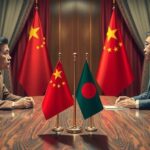Bangladesh’s Diplomatic Shift and Pakistan’s Cricket Crisis: Insights from the Region
Bangladesh’s recent China-focused diplomatic efforts are underscored by the visit of Muhammad Yunus, as concerns over declining foreign investment persist. National Day celebrations evoke a dialogue on historical narratives and the ongoing struggle for democracy. In Pakistan, the cricket team’s T20 series loss to New Zealand signals broader issues of management and performance, mirroring political frustrations in both countries.
The recent reflections on Bangladesh’s National Day have sparked discussions regarding the nation’s historical narratives and political legacies. Notably, the visit of Muhammad Yunus, the chief adviser of Bangladesh’s interim government, to China from March 26 to 29 symbolizes a potential new direction in Bangladesh’s relationship with Beijing. This visit coincided with the celebrations of Bangladesh’s National Day, which took place on March 26. Meanwhile, Pakistan’s devastating defeat in a T20 series against New Zealand has led to widespread criticism of the team’s performance.
Foreign direct investment in Bangladesh has been declining in recent years, attributed partly to the political instability following Sheikh Hasina’s ousting last August. A March 27 editorial in the Dhaka Tribune asserts that such diplomatic efforts, like Yunus’s visit to China, are essential for reinforcing Bangladesh’s image as a vibrant destination for investors. The editorial also suggests that, with the West retreating from foreign development ambitions, China is in a position to take advantage of this gap.
Another editorial by Prothom Alo on the same date supports the notion that Bangladesh must reassure the United States and other Western nations regarding investments from China. This article explores the scope of cooperation with Beijing, including critical areas like infrastructure development, healthcare partnerships, and discussions on the Rohingya refugee crisis. It emphasizes that Bangladesh should strive to maintain neutrality amidst Sino-American tensions.
A piece by M Jashim Uddin and Kazi Fahim Ahmed in the Daily Star calls for Yunus to focus on enhancing Bangladesh’s export strategies to China, noting the need for improved market access. Despite China being Bangladesh’s largest trading partner, current export levels remain low. The authors caution that Bangladesh must navigate its growing ties with China carefully to retain its strategic autonomy and safeguard national interests.
On Bangladesh National Day, an editorial in the Dhaka Tribune expressed cautious optimism among citizens, recognizing the determination that propelled the recent student movements advocating for democracy and human rights. This sentiment reflects the key values for which many sacrificed their lives during the liberation struggle in 1971.
Conversely, the Daily Star highlighted ongoing issues, particularly regarding the compilation of a list of freedom fighters. The March 26 editorial noted that, despite 53 years since independence, inaccuracies persist with hundreds of individuals falsely listed as freedom fighters. It criticized the current government for neglecting to address these discrepancies and called for a thorough investigation into such irregularities to maintain the integrity of the liberation narrative.
Saimum Parvez, a senior researcher, criticized the Awami League’s monopolization of the liberation war narrative in a Prothom Alo article. He argued that the contributions of various individuals have been overshadowed by a singular glorification of Sheikh Mujibur Rahman. Parvez posits that the struggle for freedom in 1971 and the current tensions against Hasina’s governance are interconnected, advocating for a reassessment of the narrative to transfer ownership from the party back to the people.
In Pakistan, the aftermath of the cricket series against New Zealand, ending in a 4-1 defeat, has incited frustration among fans and commentators alike. The Nation published a critical editorial on March 25, calling for a fundamental restructuring within the Pakistan Cricket Board, highlighting the turmoil amid factionalism and ineffective management.
The Daily Times labeled the series loss as a low point for the team, questioning the transformation from a formidable side to a struggling one. The Express Tribune reflected on the disappointing match statistics, illustrating the extent of the team’s decline with a recount of substantial defeats and losses during the series.
In conclusion, the visit of Muhammad Yunus to China marks a potential shift in Bangladesh’s strategy towards foreign investment amid political turbulence. Simultaneously, the reflection on National Day highlights both pride in the country’s liberation and ongoing issues regarding its history. Pakistan, facing challenges in cricket, mirrors some of the political frustrations observed in Bangladesh. Ultimately, both nations grapple with questions of identity, governance, and international alignment as they navigate their respective futures.
Original Source: indianexpress.com








Post Comment